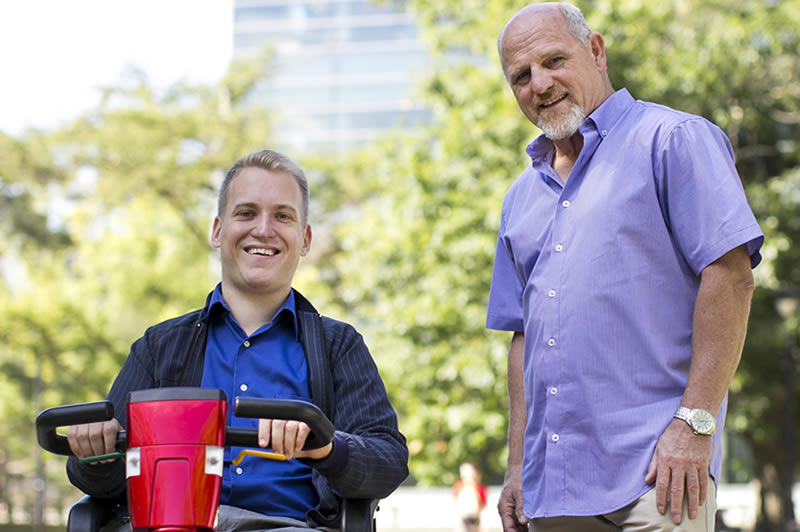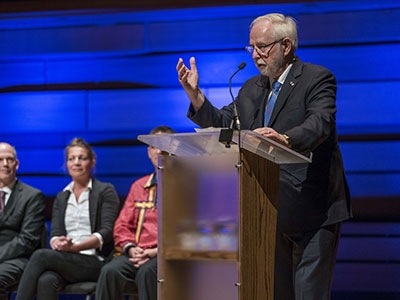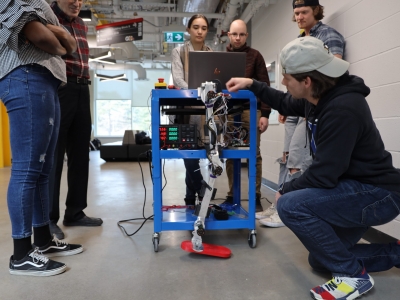By Susan Hickman
A minor in disability studies launched this academic year is the latest in a series of initiatives that point to Carleton University’s determination to be the most accessible campus in North America.
A growing field, the interdisciplinary disability studies program explores historical, cultural, economic, physical and social aspects of disability, offering students educational opportunities in community-based research and work in institutions that address the needs of people who live with a disability.
It was spearheaded by Roy Hanes, a professor in the School of Social Work and a founding member of the Canadian Disability Studies Association. The minor, says Hanes, “is receiving a great deal of interest from professors in social work, sociology, music, history, engineering, law and interdisciplinary studies.”
Sixty students were enrolled for the winter term. Patrizia Gentile, director of the Institute of Interdisciplinary Studies that houses the new minor program, was instrumental in its development.
“This minor,” says Gentile, “will allow Carleton students to envision a world full of possibilities beyond an able-bodied perspective and embrace the experiences of those of us living with visible and invisible disabilities.”
Its implementation reflects Carleton’s long tradition of promoting a culture of accessibility well beyond the average campus. Tunnels and enclosed pathways connect all buildings, academic and administrative buildings have at least one elevator, most doors open automatically and washrooms are, for the most part, accessible.
A Dedicated Access Fund allows for accessibility improvements by matching money from student levies in the amount of $100,000 annually to address immediate challenges.
Carleton’s Paul Menton Centre for Students with Disabilities (PMC), now in its 25th year, has been heralded as the gold standard for disability support services in Canada. Its unique 24-hour Attendant Services program, which is embedded in university residences, trains able-bodied students to help those who require assistance to get up in the morning, get to class and have a social life while working towards a degree.
PMC Director Larry McCloskey says the attendant program is piloting an expansion, allowing Carleton to hire more people with disabilities and proactively support existing employees who may become disabled. Eventually, the service will meet the needs of other workplaces in Ottawa, he says.
Most disabilities are “invisible,’’ including mental health disorders, hearing or vision impairments and cognitive dysfunction, notes McCloskey.
At Carleton, 92 per cent of disabilities among students are classified as non-visible, but nonetheless present challenges that can interfere with the ability to function and learn. About eight per cent of the student population at Carleton, more than 2,000 students, are registered with the PMC. They receive individualized support, disability counselling and access to assistive technology such as text-reading software.
Building on Carleton’s reputation as a leader in accessibility, the PMC launched the Research, Education, Accessibility and Design (READ) initiative to bring together experts committed to creating a more inclusive society. READ’s advisory board represents all faculties and works with all academic and service departments to support Carleton’s accessibility agenda.
READ is one of a number of projects at Carleton designed to prepare students with disabilities for employment. Its Employment Working Group has representation from a variety of Carleton offices, including human resources, career and co-op services, equity services, the international student support office and the Sprott School of Business.
Students who do not meet the disability criteria of the PMC find help from the voluntary From Intention to Action (FIT: Action) program. Launched in 2011, FIT: Action helps students balance personal and school-related stress and improve academic performance. Each year, about 250 overwhelmed or vulnerable students who do not have documentation for a disability make significant improvements under this program.

Student Nathan Hauch with Professor Roy Hanes (Roussakis Photography)
Beyond the PMC and the FIT: Action program, other students who are struggling with their studies and prefer a less intrusive service have access to a number of services, including the Student Academic Success Centre, the Writing Tutorial Service, the Student Experience Office, Learning Support Services, and the peer-led Bounce Back program.
Meanwhile, many students in Carleton’s Faculty of Engineering and Design and have created award-winning practical assistive technologies for the disabled that have been recognized by the Council of Ontario Universities through its annual Innovative Designs for Accessibility (IDeA). Earlier this year, Industrial Design student Jasmine Yeung took first place in the IDeA competition for her design of an extendable portable accessible washroom (E-PAW) for use at festivals and sporting and community events.
McCloskey notes: “The whole world is tilting towards accessibility awareness. New provincial legislation (the Accessibility for Ontarians with Disabilities Act or AODA) will make Ontario the first in the world to be fully accessible by 2025 and Ottawa wants to be the most accessible capital in the world.”
Last July, Carleton hosted a Summit on Accessibility, which brought together some of the world’s most progressive thinkers in the field to share ideas about overcoming barriers faced by people with disabilities. It was the first international conference promoting access and inclusion for all aspects of life for people with disabilities.
Monday, February 2, 2015 in Accessibility, Arts and Social Sciences, New/Unique Programs
Share: Twitter, Facebook



